Testimonial
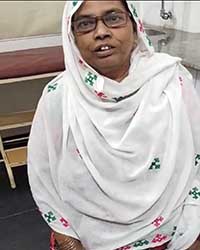
Shazia, a 45 year old resident of Gharo, had been battling diabetes for the past 2+ years, relying on oral medications to manage her condition. Despite her adherence to the prescribed treatment regimen, her blood sugar levels remained persistently high,suggesting that the treatment was not addressing the underlying issues effectively. Frustrated and seeking a solution, Shazia learned about SHINE Humanity through friends and decided to explore their services. Upon visiting SHINE’s clinics, she was assessed by the medical team, including a review by an endocrinologist, who determined that insulin injections would be a more effective approach for her condition. After starting this new treatment, Shazia experienced a significant improvement in her glucose levels, achieving better control over her diabetes. She is profoundly grateful for the prompt and effective care she received from the doctors at SHINE Clinic, who played a crucial role in managing her health more effectively. Shazia says she is appreciative of SHINE Humanity’s commitment to making quality healthcare more accessible. She highlights that the insulin injections are provided at highly subsidized rates, which is a crucial benefit for individuals who may not have the means to afford full-priced treatments.
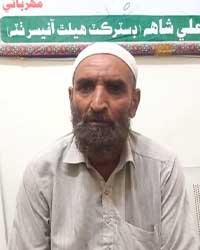
60 - year -old Muhammad Habib's journey towards recovery began with a thorough diagnosis of Hepatitis at the SHINE Humanity Clinic in Gharo. Through his treatment, Muhammad was able to understand the complexity of Hepatitis and its impact on the body, as the staff did not just focus on treating the disease, but also on addressing his overall well-being. Over the next few months, Muhammad received not only the necessary medication but also critical hepatitis B vaccinations to protect his health in the long term. The holistic support given to him was a source of comfort and empowerment for Muhammad, who as the sole breadearner of his family, had experienced significant anxiety upon receiving the diagnosis. Through the efforts of SHINE Humanity’s Gharo clinic, Muhammad was given the chance to reclaim his life. His journey serves as an inspiring reminder of how effective, compassionate care can change lives.
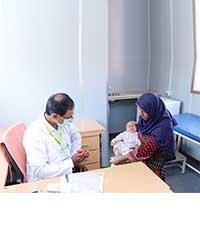
A 4 month old baby was brought in by his parents to the SHINE Humanity Clinic, with the complaint of diarrhea since birth. He had been consistently misdiagnosed, furthering his parents' worries for their child’s health. The doctors at SHINE Humanity's Garibsons Clinic in Gharo counselled the parents and told them different causes of diarrhea, including lactose intolerance. His treatment was then initiated via Zinc, ORS, and children's probiotics to enhance gut health. The baby is now thriving and both mother and baby are content. Our healthcare professionals ensure both counselling and effective treatment to all patients spanning across rural Sindh, enhancing preventative care.
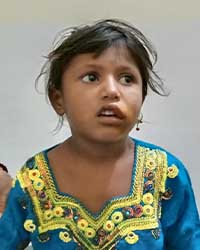
Little Mahnoor was bitten on the face by a stray rabid dog while playing with her siblings near her small village in rural Sindh. She was taken to a hospital in Thatta by her parents, however, they were unable to get treatment for her due to a shortage of rabies vaccines - a necessary measure in case of rabid animal bites. Aware of the Rabies Program at the SHINE Humanity Garibsons Facility in Gharo, the physicians referred Mahnoor to us. Concerned for the well-being of their daughter, the family quickly arrived at our clinic, where our team was mobilized immediately. Her wound was thoroughly examined and washed, followed by the administration of Rabies vaccines. Our staff also emphasized the importance of follow-up treatment to ensure that the child is completely cured.
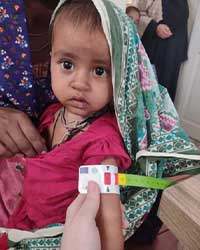
In December of 2023, a 13-month-old female toddler presented at the SHINE Humanity clinic in Chilya. At the time of assessment, her mid-upper arm circumference (MUAC) measured 10.1 cm, and her weight was 5.7 kg which indicated severe malnourishment. Her dietary intake lacked regular meals and included high-calorie, low-nutrient snacks. Following the initial consultation, our nutritionist prescribed a 14-day regimen of 28 packs of Ready-to-Use Therapeutic Food (RUTF).By the time of her third follow-up , her weight had increased to 6.4 kg and her MUAC to 11.5 cm, meaning she had upgraded to the moderate malnourishment region. This progress was followed up with a cycle of 14 packs of RUTF for two weeks each and this treatment continued with four more follow ups. Her final visit in April of 2024, revealed significant improvement in her physical condition, with her weight increasing from the initial 5.7 kg to 7.6 kg and her MUAC improving from 10.1 cm to 13.1 cm, indicating she has fallen into the safe zone accompanied by a notable decline in recurrent infections. These improvements occurred over a period of four months and four days. Malnutrition if left undiagnosed or untreated can cause not only stunting in children but also have an effect on the mental health of the growing child, especially if it is not addressed at an early age.
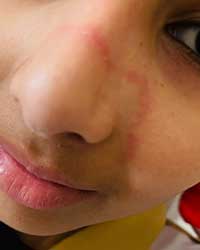
Routinely misdiagnosed and unsatisfied with care she had received from other clinics, Ramla came to the SHINE Humanity Zia Abbas Haider Memorial Clinic in Koohi Goth with a noticeable rash on her face and complaints of itching. She was examined and diagnosed with Ringworm (Tinea). With anti-fungal medication, Ramla’s facial rash showed significant signs of improvement after 1 week of treatment. Her itching has also significantly reduced, allowing her to go about her daily chores with minimum discomfort. Ramla is one of many in rural Pakistan who suffer from skin infections, highlighting the need for community-led strategies to raise awareness and reduce the prevalence of these preventable conditions.
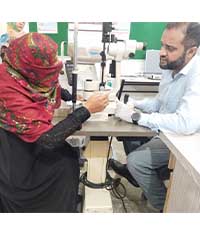
Ms. Ambreen came to SHINE Humanity’s Garibsons Clinic in Gharo with a history of vision problems accompanied by pain. Once examined by SHINE’s ophthalmologist, it was discovered that she suffered from conjunctival congestion and pupillary defect in her left eye. To make matters worse, she was also diagnosed with Glaucoma in her right eye. Unfortunately, her disease had already significantly affected her vision before she sought treatment. However, with timely intervention and treatment, we managed to successfully treat the Glaucoma and save her right eye. For most rural communities, barriers to quality primary care can reduce health-seeking behaviours. However, with early diagnosis and adherence to a treatment plan, one can effectively manage various conditions.
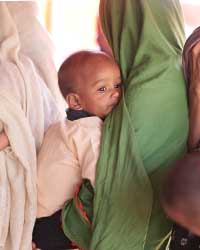
A 6-month-old baby girl was brought to a SHINE Clinic by her mother, with complaints of chest congestion and nasal blockage. After thorough history taking, it was discovered that the mother was feeding the baby while lying down, unaware of the damage that it might cause to her auditory canal. The mother’s first reaction was to request antibiotics. However, before a treatment plan was provided to her, she was educated on the appropriate positions to feed her baby, and the dangers of improper feeding practices to best ensure food intake and avoid possible harm to her child in the future. At SHINE, we believe strongly in the importance of providing evidence-based counselling to empower our beneficiaries, facilitate early intervention, and prevent further complications from developing.